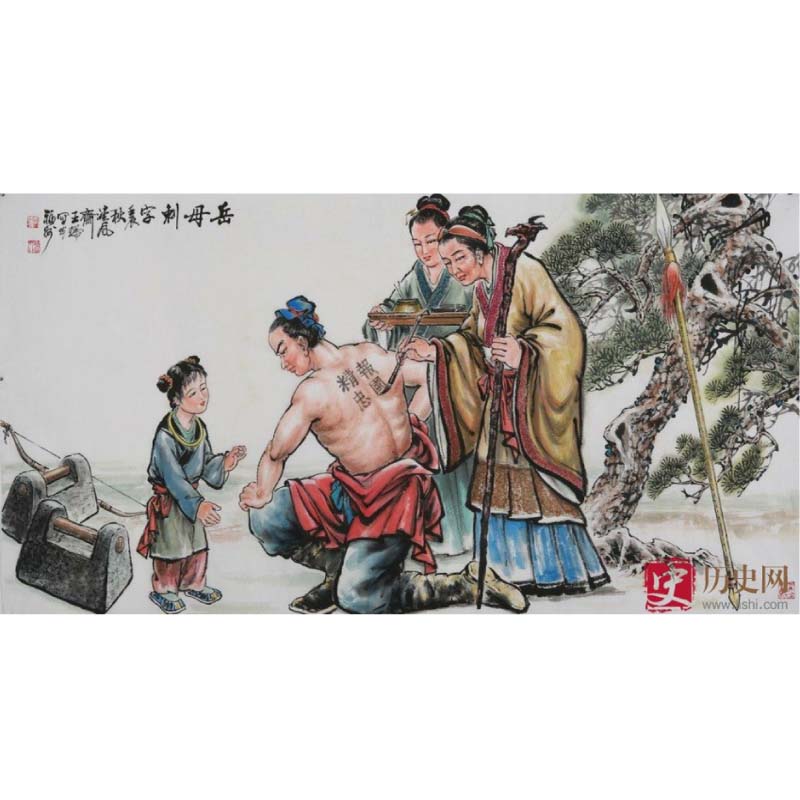Mother’s Day celebration is primarily American since it originated in the United States. But in China, the people have embraced the day as a way to honor mothers since it is very close to the customary values of respecting the elderly and practicing filial piety towards parents. It is was initially celebrated in Hong Kong and Macau but after the 1979 economic reform in China, mainland China has come to embrace the day as well.
Here are some of the great mothers in Chinese history worth remembering:
Zhang, mother of Mencius, the philosopher
There’s a famous Chinese saying that goes “meng mu san qian” (孟母三遷) which means “mother of Mencius moved three times.”
Mencius (372-289 BC) or Menzi (孟子), whose birth name is Meng Ke (孟軻), was from Zou county (present-day southeastern Zoucheng city of Shandong) of the Warring States Period (403-221 BC), is said to be the most famous Confucian philosopher, while his mother, with whom he lived after his father died while he was young, is held in high esteem.
Mencius’ mother, surnamed Zhang (仉), better known as Mother Meng, moved the family three times in order to find a suitable environment for rearing Mencius.
At first, they lived close to a cemetery, and she noticed that her son was following the behavior of people during funeral processions or when visiting graves, and often, Mencius was making tombs or performing burials, so she moved near a marketplace.
Mencius, however, started copying the loud, haggling voices of market vendors, so his mother moved them yet again to another place, which was near a school. Mencius this time imitated the study habits of scholars and played at arranging sacrificial vessels and the rituals of bowing, yielding, entering and withdrawing. His mother realized that it was best to stay there for good.
Mencius was a lazy student when he was younger so his mother, as a way to teach him, ripped apart a cloth she was weaving to demonstrate to him that a brilliant but lazy mind is useless. “If a woman who abandons her livelihood and a man who neglects cultivating his virtue do not become burglars or thieves, then they will end their days as slaves.”
Thus, Mencius, frightened by his mother’s words, took all his mother’s lessons to heart and strove harder in his studies and soon became a dedicated scholar of the Confucian creed, whose teachings became a standard of family values.
When she died, Mencius took three years’ leave of absence from his duties to mourn his mother. In ancient China, a person whose parents died should temporarily resign from their duties to observe traditional mourning.
Mencius’ mother is included in the Lienü Zhuan (烈女傳 Mother Biographies of Outstanding Women), one of the greatest letters in the Han Dynasty (206 BC-220 AD), written by Liu Xiang (劉向).
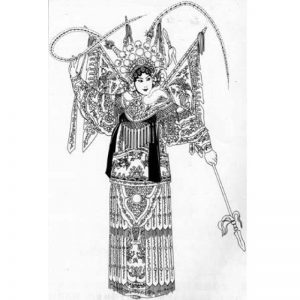
She Taijun, the legendary heroine
From the Northern Song Dynasty (960-1127), She Saihua (佘賽花), more commonly known as She Taijun (佘太君), was a legendary warrior who married Yang Ye (楊業) and bore seven sons and two daughters. She is a prominent character in the collection of stories “Generals of the Yang Family.”
Her husband Yang Ye was a Song commander-in-chief who died together with their sons during the battles of Golden Beach and Mount Twin Wolves because the military general, Pan Mei (潘美), abandoned them. She then became a commander-in-chief and was awarded a Dragon Head Cane, the emperor’s symbol.
Most male warriors, including her grandson, died defending the country against succeeding invasions. She then encouraged her grandson’s widow, Lady Mu Guiying (穆桂英), to stand up and lead the forces against the invaders. Lady Mu and the rest of the Yang clan’s female warriors succeeded.
She Taijun became the matriarchal figure of the Yang clan, a family known for their bravery and sacrifice. A place of worship is named after her, the She Taijun Temple (佘太君廟) in Baiwangshan Forest Park in Beijing.
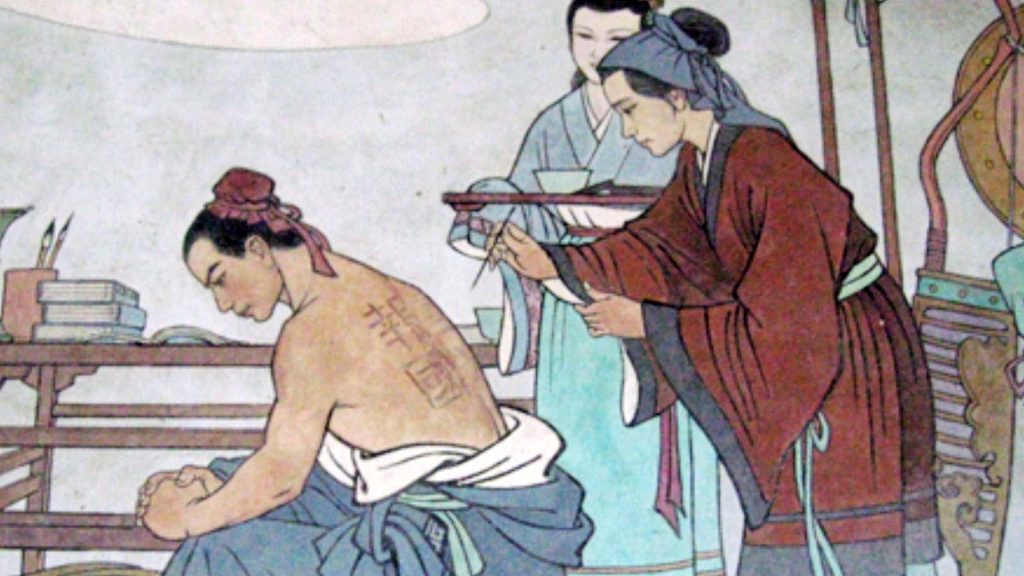
Yue Mu, mother of General Yue Fei
Yue Mu (岳母) is best known and honored for her shaping the character of her son, the great General Yue Fei (岳飛 1103-1136), instilling in him the virtue of placing loyalty to the country over filial piety towards parents.
In the 12th century, the Song Dynasty (960-1279) was being invaded and conquered by the forces of Jurchen army who had already occupied much of the North.
Young Yue Fei hesitated to join the forces against the invaders as he worried about his mother, but his mother asked him to take his shirt off and tattooed these words on his back: “Jing zhong bao guo” (盡忠報國) which means to “serve the country with utmost loyalty.” Thus, encouraged by his mother’s support, Yue Fei went off to battle with greater strength.
Despite the modest success of the Jurchen, Yue Fei was undefeated in battle. Once, with only 500 men, he defeated about 100,000 Jurchen soldiers and forced them to leave.
Yue Fei’s mother’s discipline and values made him one of the greatest military generals during the Southern Song Dynasty (1127-1279) and turned him into a symbol of filial piety, loyalty and a national symbol of hope during difficult times.
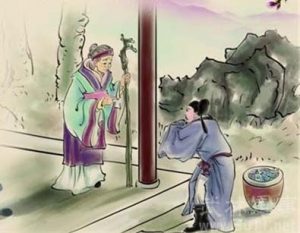
Mother Zhan refuses the salted fish
Tao Kan (陶侃 259-334), the great-grandfather of Jin Dynasty (265-420) famous poet Tao Yuanming (陶淵明), was Duke Huan of Changsha and a renowned Jin Dynasty general and governor.
In an era of extravagance, civil wars and great turmoil and where the non-Han ethnicities overran the north of the country, Tao Kan was among the few people who distinguished himself by his good reputation in the court of Eastern Jin.
Tao Kan’s father, Tao Dan (陶丹), was a border commander of Wu during the Three Kingdoms Period (220-280). He died while Tao Kan was young. His mother, Zhan (湛), a strong-willed woman, was determined for her son to succeed in life.
Zhan made a living by weaving, using the money to provide a good education as well as enable him to establish a network of friends. Her efforts paid off when Tao Kan became a county secretary.
Tao Kan’s next opportunity came when Fan Kui (范逵), an official in the prefect’s office of Fanyang in present-day Jiangxi province, visited them during a snow-bound winter. Though it was clear the family was impoverished, they managed to host Fan Kui properly.
To provide a decent meal for their guest, Zhan cut off some of her hair and bought food and drink with the money she got for the hair. She fed Fan’s horses with straw from their mattress. Tao Kan chopped up parts of their house to be used as firewood.
Touched by their efforts, Fan Kui recommended him to Zhang Kui (張夔), prefect of Lu Jiang, and Tao Kan got his start in the civil service.
One time, while Tao Kan was serving as a minor official in charge of fish weirs in Xunyang Commandery, he sent a present of salted fish in an earthenware crock to his mother. Zhan sealed the fish back up and sent it back with a letter upbraiding Tao Kan: “While you are serving as a minor official, if I receive official property as a present, it not only makes me unhappy, but adds further to my unhappiness!”
This incident taught Tao Kan a valuable lesson and was the basis for his integrity and honesty.
Mother Lü, first Chinese rebel leader
During the Xin Dynasty (新朝 9-23 AD), a young civil servant, Lü Yu (吕育), who served the Haiqu county government as district official, was executed by the district magistrate for a minor offense.
When his mother, Mother Lü (吕母), who was extremely wealthy, learned of this, she got furious and used her wealth to buy weapons and supplies and started recruiting poor peasants. After gaining support from several thousand people dissatisfied with the government, she stormed the Haiqu county and captured the magistrate. She beheaded him and offered the magistrate’s head on her son’s tomb in retaliation for his death.
Mother Lü is credited to have inspired wave of uprisings against the Xin Dynasty, and is recorded in history as the first Chinese female rebel leader. She died of an illness in 18 AD.
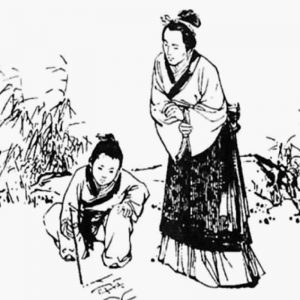
Zheng, mother of Ouyang Xiu
Ouyang Xiu (歐陽修 1007-1072) was a Chinese statesman, historian, essayist, calligrapher and poet of the Song Dynasty. He is also known as Yongshu (永叔), and called himself The Old Drunkard (醉翁), or Householder of Six Ones (六一居士). The Six Ones pertained to 1000 ancient books, 10,000 books, one musical instrument, one chess board, one pot of wine and one 60-year-old man. In Western parlance, he is regarded as a Renaissance man.
Ouyang Xiu’s father, Ouyang Guan (歐陽觀), was a minor government official. He died when Ouyang was four. The burden of supporting the family fell on his mother, Zheng (鄭). She brought Ouyang to Suizhou in central China’s Hubei province to seek help from Ouyang’s uncle.
Being from a poor family, Zheng received little education. But she was wise and did not fear hardship. She told Ouyang stories to teach him about life principles and values, and she stressed the importance of not following the crowd blindly.
Zheng tried every means possible to teach her son how to read and write. She taught him poems written by the famous Tang Dynasty poets. Although Ouyang was not able to understand them at first, they enhanced his interest in reading.
When Ouyang reached school age, the family could not afford pen and paper, so Zheng came up with the idea of using a grass stalk as a pen and spread sand on the ground as paper. In that way, Ouyang practiced his penmanship.
A book lover, Ouyang would memorize the contents of books that he had just skimmed. When he was 10 years old, Zheng encouraged Ouyang to borrow books from neighbors with large book collections. Ouyang would then copy these books out by hand.
Ouyang became a public servant when he passed the imperial examinations. Much to Zheng’s happiness and gratification, he became a famous figure in the literary circle.
Zheng often told Ouyang stories about his father’s good deeds and emphasized the importance of having integrity. Her instructions went a long way in influencing Ouyang’s career as an official. Zheng died at the age of 73 and Ouyang buried her in her hometown.
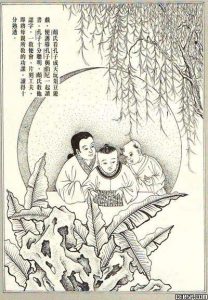
Yan Zhangzai, Confucius’ mother
Confucius or Kongzi (孔子 551-479 BC) was born late in his father’s life. According to legend, Confucius’ mother Yan Zhengzai (顏徵在) was a young concubine of a 60-year-old man named Shu-liang He (叔梁紇), a nobleman with battle merits from the kingdom of Lu. He wanted a son to carry on the family name.
Confucius’ maternal grandfather was a learned scholar and taught his daughter to read and perform li (禮), the ancient Chinese rites and rules of etiquette. Yan became an educated and cultured woman.
When Confucius was three years old, his father died and Shu-Liang He’s family immediately disowned Yan and her son. Threatened with starvation, Yan and Confucius moved to Qu Fu, the capital of the Lu kingdom.
When mother and son found a new home, Yan moved her father’s book collection there and designated one of the three rooms as the study. She began teaching Confucius when he was five.
In order to make a living, Yan accepted five children as students. She taught them to read, count and sing. Confucius joined them at age six and through hard work and careful nurturing, finished his early education before the age of 10.
This had a direct impact on Confucius’ future setting up of private schools and educational institutions.
Later, Yan closed her school and sent Confucius to the best school in the city to study poetry, ancient books and records and history.
Yan passed away when Confucius was 17. Confucius insisted that Yan should be buried alongside his father’s grave.
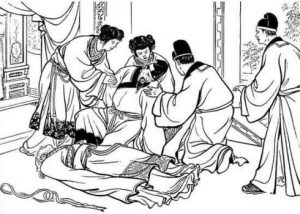
Mother Xu hangs herself in shame
Xu Shu (徐庶) served the warlord Liu Bei (劉備) during the late Han Dynasty (206 BC-220 AD).
His father died when he was young, leaving his mother (徐母) to raise him and his younger brother Xu Kang (徐剛). Xu Shu’s brother died while he was serving Liu Bei during a war between Liu Bei and Cao Cao.
In an account in the Romance of the Three Kingdoms (三國演義), some time after the battle of Changban, he received a letter from his mother stating that she had been imprisoned by Cao Cao and would not be released unless he surrendered himself and left Liu Bei’s service. Distraught, Xu Shu insisted that he be allowed to leave immediately.
Xu Shu’s mother was astonished to see her son. After Xu Shu related what had transpired, Mother Xu realized the letter was fake and Xu Shu had been tricked. She swore and berated her son for being gullible and leaving his proper master.
Xu Shu cowered on the floor in the face of her motherly wrath. Mother Xu then retreated behind a screen and hanged herself in shame. Xu Shu was utterly broken with grief. He observed the mourning period and guarded his mother’s grave site, and refused all of Cao Cao’s gifts of condolence.
Together with Yue Fei’s mother, Mencius’ and Xu Shu’s mothers are considered the Three Wise and Good Mothers of China.
